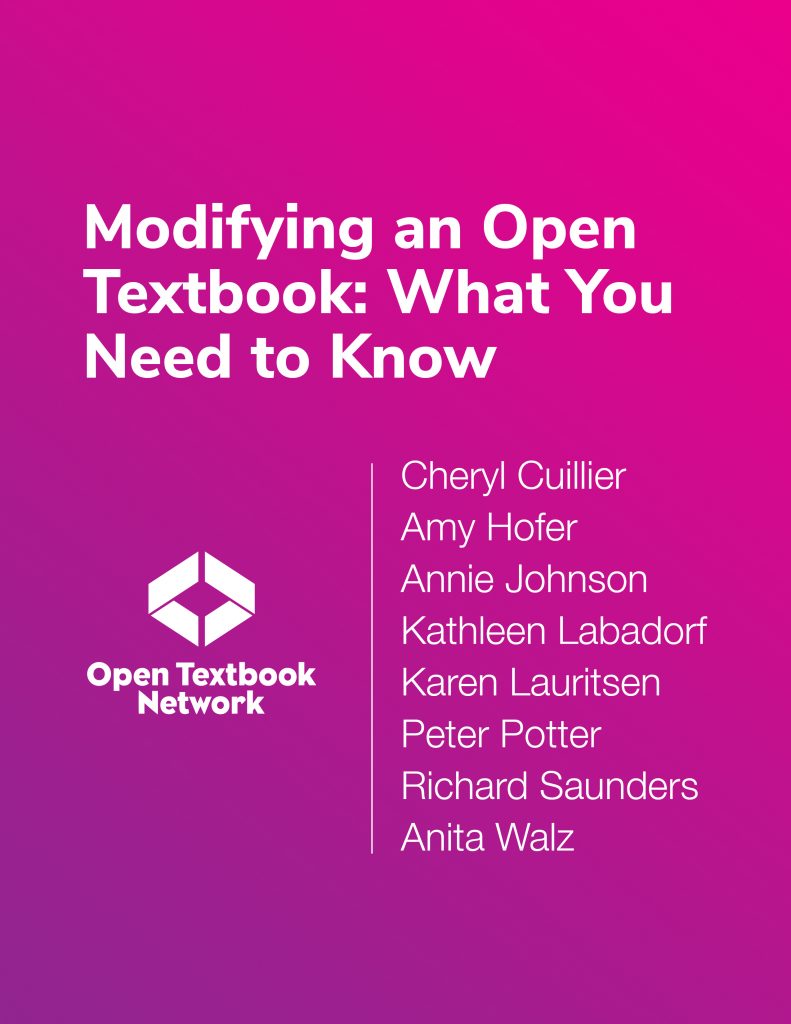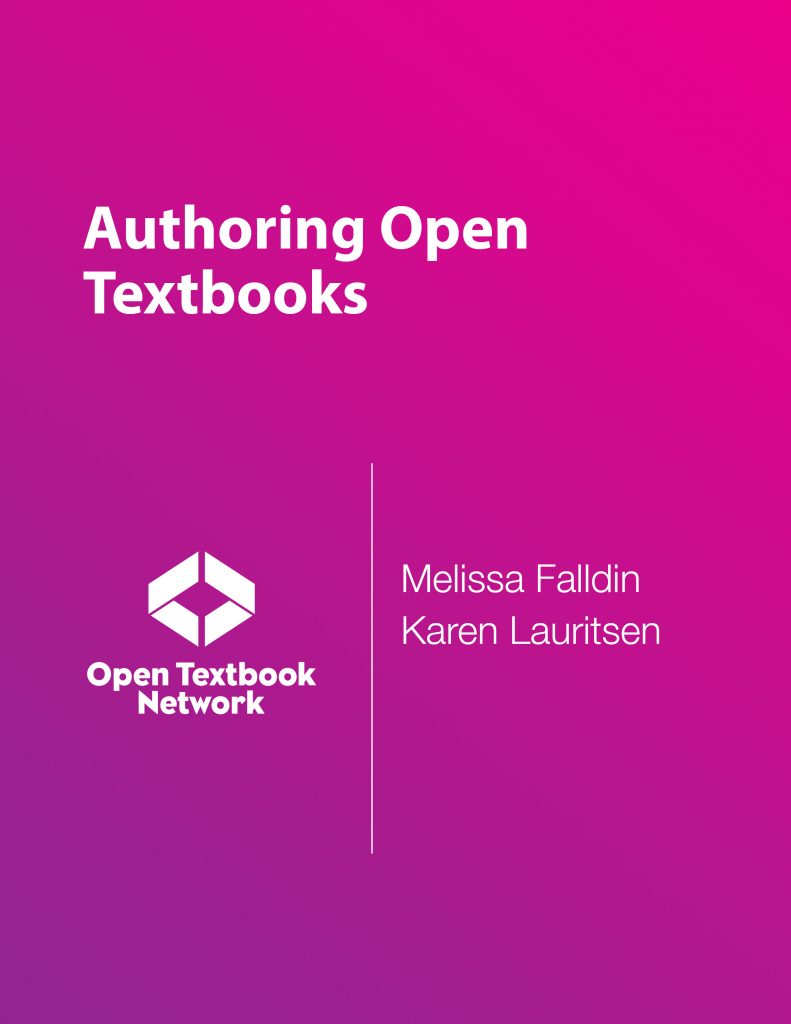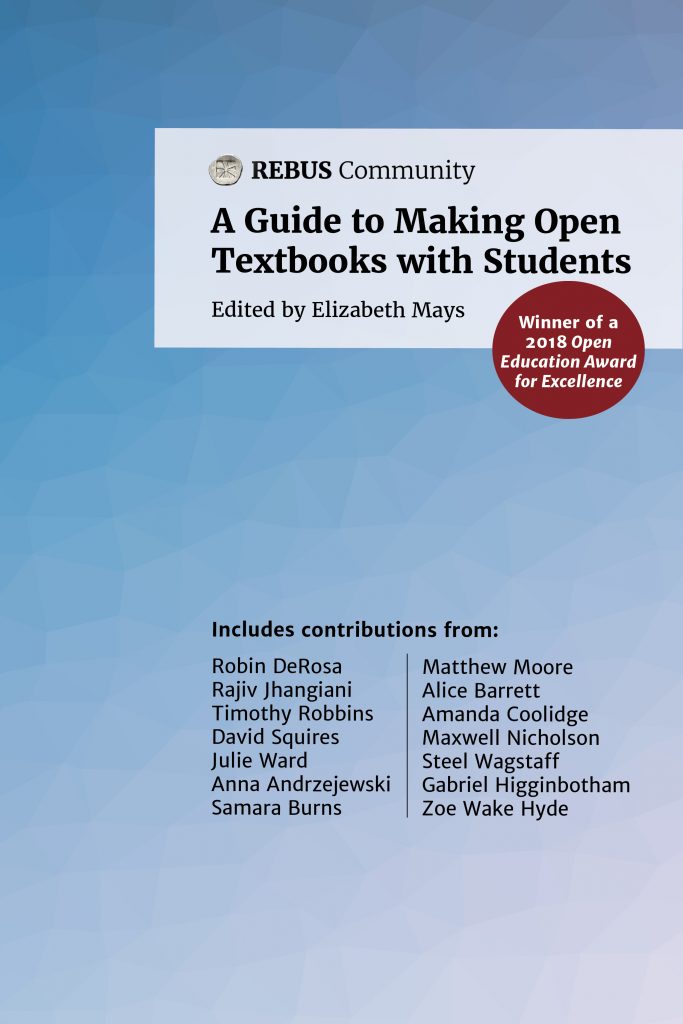April 27th, 2018 from 10:30am to Noon
Andrew Kusak (VT, English, PhD student)
“Cybersecurity, Internet, Users: Legal Rhetoric, Digital Surveillance, and the Material Contexts of Privacy”
April 27th, 2018 from 10:30am to Noon
Andrew Kusak (VT, English, PhD student)
“Cybersecurity, Internet, Users: Legal Rhetoric, Digital Surveillance, and the Material Contexts of Privacy”
April 20th, 2018 from 10:30am to Noon
Sylvester Johnson (VT, Humanities / Religion & Culture)
“Can Robots Make Love?: Artificial Intelligence, Human Identity, and the Life of Things.”
This is a five-step guide for faculty, and those who support faculty, who want to modify an open textbook. Step-by-step instructions for importing and editing common open textbook file and platform types are included. Read it for yourself at: https://press.rebus.community/otnmodify/

April 13th, 2018 from 10:30am to Noon
Tabitha James (VT, Business)
“Organismic Integration Theory to Explore the Associations between Users’ Exercise Motivations and Fitness Technology Feature Use”
April 6th, 2018 from 10:30am to Noon
Quran Karriem (Duke, Computational Media, Arts & Cultures, PhD candidate)
“Embodied Kinesonics: Interface, Transformation and Disappearance”
Abstract
Where does the body end, and the interface begin? When does an interface become an instrument, and what role does virtuosity play when sound production is dissociated from physical causality? With the increasing use of real-time computation in live settings, what is the relationship between process and performance? This hybrid artist talk / demonstration will feature recent projects by sound artist, interface designer and researcher Quran Karriem, who traces the shifting boundaries between bodies, instruments and interfaces across a varied array of emergent hardware and software instruments and performance idioms.
Bio
Quran holds a master of fine arts in sound design from the Savannah College of Art & Design, and a bachelor of music in composition from the University of Georgia. He has extensive software development experience, previously served on the audio technology faculty at American University, and is one of two scholar-artists recruited to inaugurate a new PhD program in Computational, Media, Arts & Cultures at Duke University, where he is a member of the Society of Duke Fellows and develops gestural and sonic technologies as part of the SLIPPAGE performance, culture and technology lab.
This guide is for faculty authors, librarians, project managers and others who are involved in the production of open textbooks in higher education and K-12. Content includes a checklist for getting started, publishing program case studies, textbook organization and elements, writing resources and an overview of useful tools. Read it for yourself at: https://press.rebus.community/authoropen/

March 30th, 2018 from 10:30am to Noon
LaDale Winling of the Virginia Tech History Department will present “Mapping the Red Line: Home Finance and Racial Segregation in the Twentieth Century.”.
A handbook for faculty interested in practicing open pedagogy by involving students in the making of open textbooks, ancillary materials, or other Open Educational Resources. This is a first edition, compiled by Rebus Community, and we welcome feedback and ideas to expand the text. Read it for yourself at: https://press.rebus.community/makingopentextbookswithstudents

Beginning Monday, April 9, the Athenaeum will host a short series of structured workshops developed to introduce humanities faculty, students, and interested staff to R and Python, specifically for humanities projects. There will be a total of four sessions, two workshops for each programming language. The workshops are intentionally conceived with the absolute beginner in mind. In essence, we hope to provide a pathway for anyone who has become aware that R and Python may be of use to their work and simply need a means to get started.
The schedule:
M 4/9, 11:30a-1:00p: Beginning Python for DH I
W 4/11, 11:30a-1:00p: Beginning R for DH I
M 4/16, 11:30a-1:00p: Beginning Python for DH II
W 4/18, 11:30a-1:00p: Beginning R for DH II
Sessions will be facilitated by Chris Miller, Nick Bolin (Python), and Rohan Joseph (R). We look forward to hosting participants, who are welcome to join any combination or all of these workshops. We will provide laptops pre-loaded with needed tools for the sessions.
Please do share broadly among your networks, and feel free to send any follow-up questions directly. RSVPs, while not required, are appreciated in advance for a general count. Please contact Chris Miller, Digital Humanities Coordinator for more information or to RSVP. https://lib.vt.edu/spaces/athenaeum.html
Christopher A. Miller
A multi-modal, media-enhanced performance of John Cage’s 45′ for a Speaker (1954)
Athenaeum Classroom (Newman 124)
*hot teas and donuts served
Published in Silence, a collection of John Cage’s writings, 45′ for a Speaker is a performative series of lectures that provide insight into specific pieces of the prepared piano repertoire in addition to Cage’s general notions of composition by chance operations and consultation of the I-Ching. Such processes were also central to John Cage’s two artistic residencies in the local area, orchestrated primarily by Ray Kass, in 1983 and 1988 (Mountain Lake Workshop). This performance takes full advantage of the mediated classroom of Athenaeum to project selections from Cage’s New River Watercolors (1988) in complement with Cage-inspired digital art from Tony Obr and Kalak, photographs by LS King, and musical compositions from Bob Pillow and Kalak. Post-performance discussion will focus on Chris’ research on archiving as performance practice and the archives as a space for performance, which was the focus of his recent artistic residency at the Seoul Dance Center.
2:30-4:00p